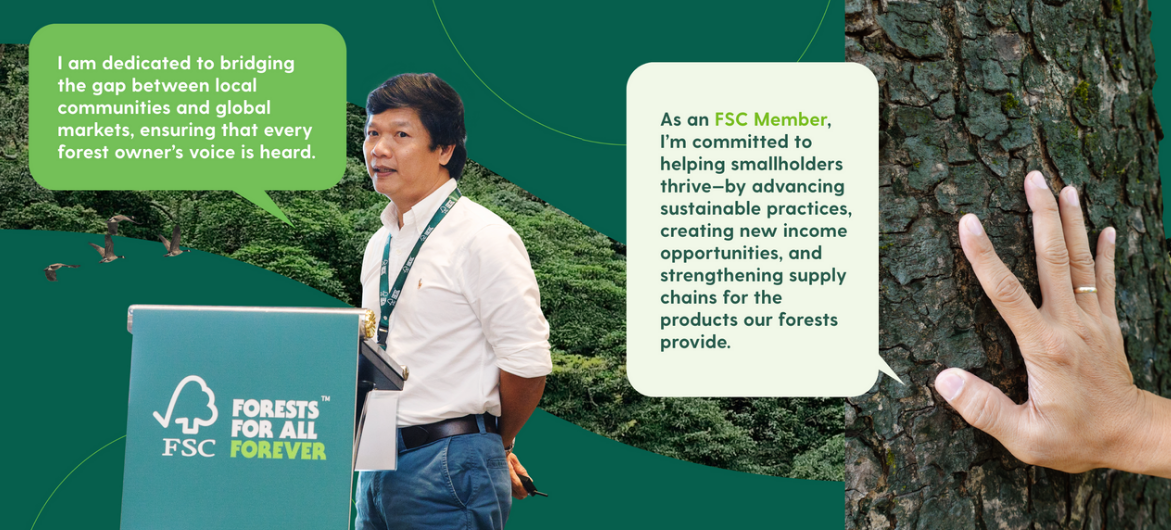
Dinh Dai NGUYEN
FSC Individual Member | Vietnam, Social South
What inspired you to become an FSC member?
I have been involved with FSC since 2012 through various roles in NGOs supporting FSC certification for smallholders and forest companies in Vietnam. I’ve witnessed the challenges faced by forest owners—especially smallholders in upland villages—such as market risks, unstable crop incomes, and limited resources for sustainable forest management.
At the same time, I saw opportunities in non-timber forest products (NTFPs), community-based ecotourism, and other ecosystem services that could empower smallholders to manage forests sustainably and improve their livelihoods. These experiences inspired me to join FSC Membership.
Have you seen FSC’s impact firsthand?
In 2013, while working as a project officer at WWF-Vietnam, we successfully connected FSC-certified acacia smallholder forest owners with an IKEA supplier. The supplier purchased FSC-certified acacia wood at a 20% premium compared to non-FSC wood, establishing the first-ever FSC acacia market in Vietnam.
This economic benefit was a strong motivator for smallholders to maintain sustainable social and environmental practices in line with FSC standards. During this period, we also saw important behavioral changes among acacia forest owners, such as stopping the burning of vegetation after harvesting.
What change or improvement do you hope to drive through FSC membership?
In the coming years, I aim to:
1. Promote RFSS (Regional Forest Stewardship Standard for Smallholders) for smallholder rubber plantation owners,
2. Secure payments for FSC ecosystem services, especially through community-based ecotourism, and
3. Strengthen supply chains for FSC-certified non-timber forest products like rattan, bamboo, and tung oil seeds.
How has FSC membership enabled you to make change?
As an FSC member, I have had the opportunity to work with FSC Vietnam, FSC Netherlands, and FSC Asia-Pacific to build networks between smallholder forest owners and external partners. These partners include buyers such as IKEA suppliers, My Nghe Xanh Rattan Co, and Planetzero.Earth, as well as FSC ecosystem services sponsors like Inproba (Netherlands), Etifor (Italy), and WWF-Vietnam. Through these collaborations, we have helped smallholders access new markets and vital support for sustainable forest management.
My journey with FSC began in the upland villages of Vietnam in 2012, where I saw firsthand how sustainable forestry can change lives.

What unique challenges does FSC help address?
Smallholder forest owners often struggle with limited financial resources, lack of technical know-how, and unpredictable markets, which make sustainable forest management difficult. FSC helps address these challenges by connecting smallholders with NGOs, buyers, and donors on a global scale.
For example, FSC has helped the Quang Tri Smallholder Forest Certification Groups build networks with buyers and sponsors for FSC-certified products like acacia, rattan, and bamboo, as well as for ecosystem service sponsorships. This support has opened new markets and created more stable opportunities for smallholder communities.
What are your key accomplishments?
Together with colleagues from FSC Vietnam and the Netherlands, I helped Quang Tri Smallholder Forest Certification Groups secure ecosystem service sponsorships from Inproba (Netherlands) and Etifor (Italy). We also facilitated support and grants from WWF Vietnam to help the Association maintain FSC certification, protect forests, and continue reforestation efforts.
Looking ahead, I am committed to using my role as an FSC Member to build stronger partnerships and champion new solutions that help smallholder communities thrive. Thank you for including my voice in the Voices of APAC series—it’s inspiring to be part of a community that is driving real change across our region.
